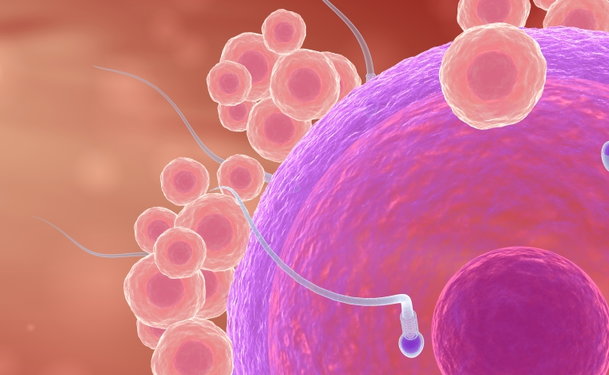Doctors attribute one-third of infertility cases to male factors, meaning issues with the sperm; one-third to female factors, and one-third to a combination of factors in both the male and female partner.
The road to conception
Conceiving and bringing a baby to term is a complicated process, and many things have to happen in concert:
- Your ovaries first need to release an egg
- Your fallopian tubes then pick up the egg
- Sperm travels through the vagina, into the uterus, and up the fallopian tube to fertilize the egg
- The fertilized egg then travels down the fallopian tube to the uterus where it implants in the uterine lining
Any problem along the way can cause infertility. Infertility is typically defined as the inability to get pregnant after trying for one year. If you can’t sustain a pregnancy, you are also considered to have infertility. According to current statistics from the Centers for Disease Control, this condition affects 6.7 percent of women from the age of 15-44 in the United States.
What causes female infertility?
The three main causes of female infertility include:
- Ovulation problems
- Structural problems
- Unexplained infertility
Fertility and ovulation problems
Ovulation problems account for approximately one-third of all female infertility problems. When you don’t ovulate properly, eggs are not available to be fertilized. If your menstrual periods are irregular or not present, it is an indication that there is a problem with ovulation. Two common ovulation problems are: polycystic ovarian syndrome (PCOS) and age.
- PCOS: In the case of PCOS, your ovaries overproduce "male" hormones (androgens), causing irregular ovulation, or even a lack of ovulation.
- Age: Fertility declines as a woman ages due to the normal age-related decrease in the number of eggs that remain in her ovaries, as well as a decrease in the quality of her eggs. Generally, fertility begins to drop in your late 20s or early 30s, and falls more rapidly after the age of 35. Today, as more women wait until they become older to start their families, ovarian problems related to age are on the rise.
Structural problems and fertility
Causes of infertility related to structural problems include:
- Damaged or blocked fallopian tubes
- Endometriosis, a condition that causes scar tissue to grow on ovaries and fallopian tubes
- Congenital abnormalities of the uterus
- Uterine fibroids
Unexplained female infertility
To determine if you have female infertility, your doctor will perform a fertility evaluation, which will include an assessment of your ovaries, ovarian reserve, fallopian tubes and uterus. Sometimes these tests do not point to a specific cause of infertility. Approximately 10 percent of female fertility issues are unexplained. Just because the cause of infertility is unknown does not mean it cannot be treated. There are various treatments available for women with unexplained infertility, including in vitro fertilization (IVF), intrauterine insemination (IUI), timed conception and lifestyle changes, to name a few.
Lifestyle concerns
Many factors affect a woman’s fertility, and a healthy lifestyle will certainly increase your odds of conceiving. Some factors that you can control that can negatively impact your fertility include:
- Smoking
- Excessive alcohol use
- Excessive use of marijuana or recreational drugs
- Poor diet or a diet high in mercury
- Being over or under weight
- Having a sexually transmitted disease or infection
What causes male infertility?
Male infertility is due to low sperm production, sperm that aren’t shaped or are not moving properly, or blockages that prevent the delivery of sperm. Illnesses, injuries and chronic health problems can affect male infertility.
One specific cause of male infertility is the presence of a varicocele, which is, in essence, a varicose vein on the testicle. These are present in 15 percent of the general male population and 40 percent of infertile men. Varicoceles may cause reduced sperm count and abnormal sperm morphology, which cause infertility. Varicoceles can usually be diagnosed by a physical examination of the scrotum.
Hormonal problems are another cause of male infertility, as are psychological and behavior problems such as erectile dysfunction and premature ejaculation. Fertility is a reflection of a man’s overall health and can be impacted by lifestyle and personal choices, including:
- Cigarette smoking
- Heavy alcohol use
- Drug use
- Anabolic steroid use
- Environmental toxins
- Excessive stress
When to See a Doctor about Infertility
If, after a year of tying to become pregnant you haven’t conceived, you should consider an infertility evaluation. For women who are 35 or older, the time frame drops to six months. Seek care sooner than six months to a year if you have a reason to suspect an underlying problem—for instance, if you have very irregular menstrual cycles, or if you or your partner has a known fertility problem.
Updated July 2014


